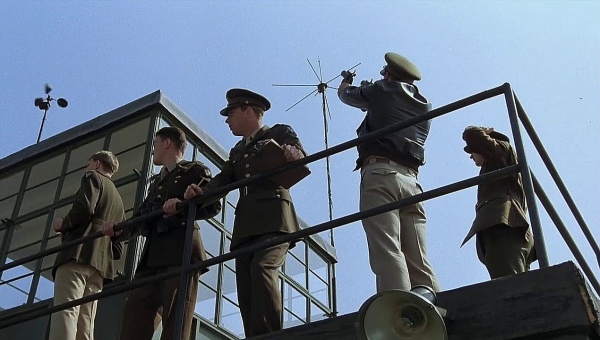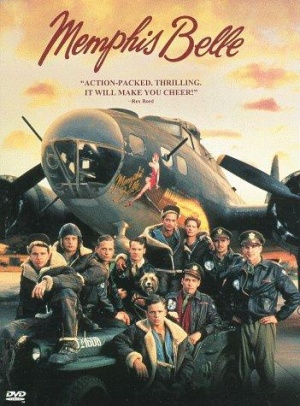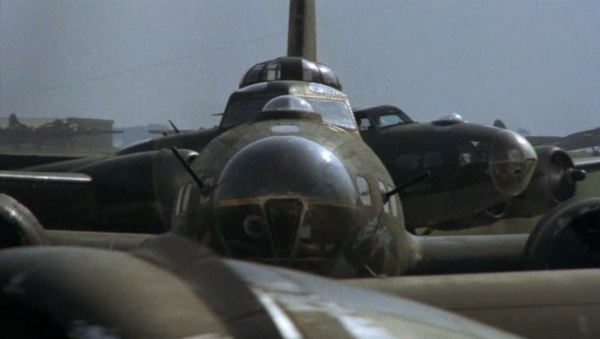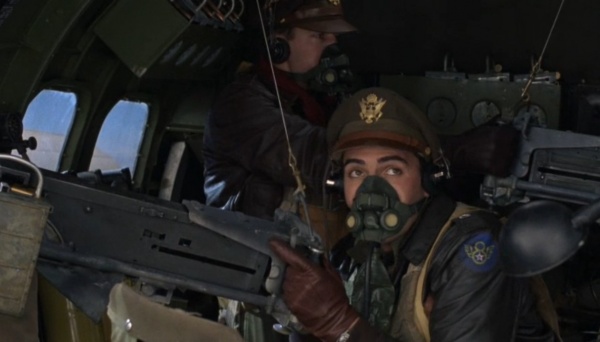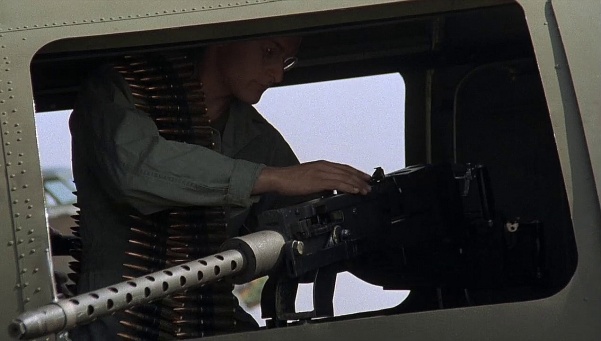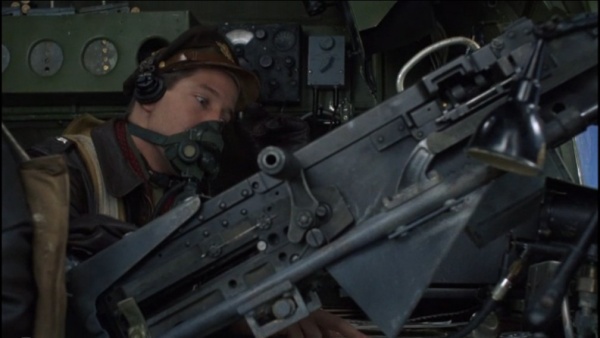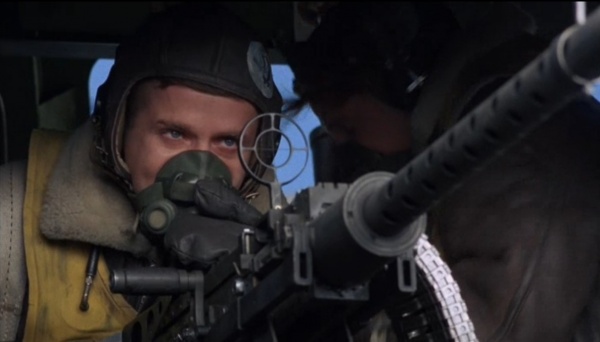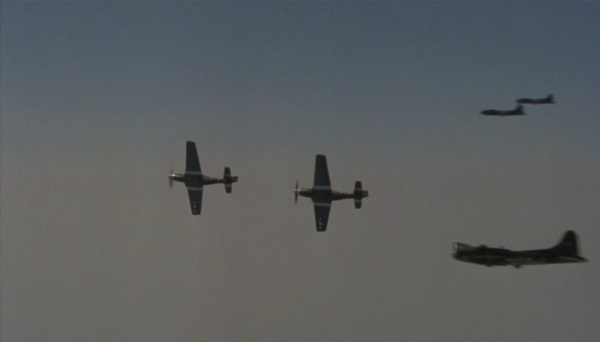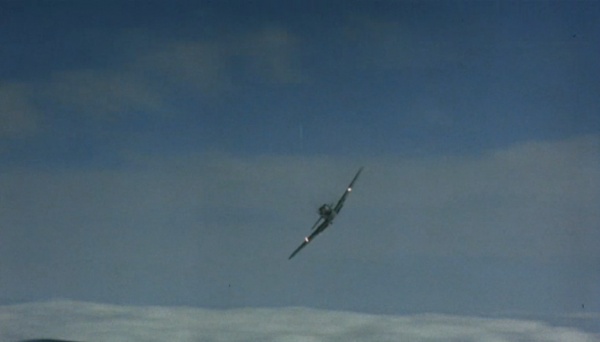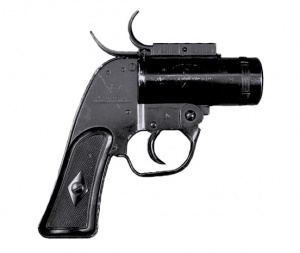| If you have been locked out of your account you can request a password reset here. |
Difference between revisions of "Memphis Belle"
(I have been infected with airquotes don't come near me) |
|||
| (20 intermediate revisions by 2 users not shown) | |||
| Line 1: | Line 1: | ||
[[Image:MemphisBellePoster.jpg|thumb|right|300px|''Memphis Belle'' (1990)]] | [[Image:MemphisBellePoster.jpg|thumb|right|300px|''Memphis Belle'' (1990)]] | ||
| − | '''''Memphis Belle''''' is a 1990 WWII film starring [[Matthew Modine]], [[Tate Donovan]], [[Billy Zane]], [[Harry Connick Jr.]], [[D.B. Sweeney]], [[Eric Stoltz]], and [[Sean Astin]] as members of a B-17 bomber crew who must complete one more mission to become the first to survive their entire tour together. | + | '''''Memphis Belle''''' is a 1990 WWII film directed by Michael Caton-Jones and starring [[Matthew Modine]] (who wears the uniform and jacket of his real-life B-17 pilot uncle, Wylder Modine, in the film), [[Tate Donovan]], [[Billy Zane]], [[Harry Connick Jr.]], [[D.B. Sweeney]], [[Eric Stoltz]], and [[Sean Astin]] as members of a B-17 bomber crew who must complete one more mission to become the first to survive their entire tour together. On the ground [[David Strathairn]] plays the stoic, no-nonsense group commander, while [[John Lithgow]] plays an Army publicist covering the ''Belle's'' final raid. |
| − | ''Memphis Belle'' the aircraft was played by two different B-17Gs visually modified to look like the earlier F model, one an American aircraft, N3703G, and the other a British B-17, G-BEDF ''Sally B'', which was used for scenes involving pyrotechnic effects. N3703G was kept in this configuration after the movie, and is now exhibited as "movie ''Memphis Belle''". Most interior shots were created on ground-based sets at Pinewood Studios rather than inside real aircraft, and Pinewood also handled any model shots. Ground sequences, including takeoffs and landings, were filmed at a decommissioned Royal Air Force base, RAF Binbrook, in Lincolnshire, England. Flying sequences instead operated from the runway of the Imperial War Museum in Duxford: all extras in the film were assembled by holding auditions in the latter area, and included serving and former members of the Royal Air Force. | + | The film was originally going to be about an RAF bomber, but was changed to an American aircraft because it was thought this would have greater appeal to a US audience. The final story is very loosely based on the wartime documentary ''The Memphis Belle: A Story of a Flying Fortress'', which was directed in 1944 by legendary Hollywood director William Wyler (at the time a Major in the USAAF), the father of co-producer Catherine Wyler and the inspiration for John Lithgow's character, Lieutenant-Colonel Bruce Derringer. Despite being a semi-fictional story that bears little relation to the real ''Memphis Belle's'' final mission, the film is notable for the amount of authentic planes used for the production: seven vintage P-51 Mustangs and five of the eight airworthy B-17s that existed at the time were acquired for the movie, with one (a French-owned B-17G, F-BEEA, that was being used to film the others and had previously been used to shoot in-flight footage for ''[[Dr. Strangelove]]'' in 1964) destroyed in an accident during filming, thankfully without any fatalities among the crew. Usually a maximum of three of the aircraft shown in flying sequences are real with the rest being CG, and in several shots it can be seen that the B-17s have different nose art and names on the left and right sides of the fuselage so they can play multiple aircraft while keeping flight hours down. The "crew" also included a North American B-25 Mitchell and a Grumman TBM Avenger as camera planes: the tail of the latter was painted to look like a B-17's tail, and appears in the film. |
| + | |||
| + | ''Memphis Belle'' the aircraft was played by two different B-17Gs visually modified to look like the earlier F model, one an American aircraft, N3703G, and the other a British B-17, G-BEDF ''Sally B'', which was used for scenes involving pyrotechnic effects. N3703G was kept in this configuration after the movie, and is now exhibited as "movie ''Memphis Belle''". Most interior shots were created on ground-based sets at Pinewood Studios rather than inside real aircraft, and Pinewood also handled any model shots: two flying 1/6 scale B-17Fs were built by a team of British modelmakers, Robbie Scott, Steve Onions and Nigel Blake. Both were destroyed during filming, one by fire and one in a crash, though the latter was later repaired and is currently in the hands of a private collector. Fiberglass props based on these were used to populate the taxiway during the takeoff sequence. Ground sequences, including takeoffs and landings, were filmed at a decommissioned Royal Air Force base, RAF Binbrook, in Lincolnshire, England. Flying sequences instead operated from the runway of the Imperial War Museum in Duxford: all extras in the film were assembled by holding auditions in the latter area, and included serving and former members of the Royal Air Force. | ||
{{Film Title}} | {{Film Title}} | ||
| Line 11: | Line 13: | ||
=Machine Guns= | =Machine Guns= | ||
==Browning M2 Aircraft== | ==Browning M2 Aircraft== | ||
| − | The main defensive armament of the B-17 Flying Fortresss including the ''Memphis Belle'' is the .50 caliber [[Browning M2 Aircraft]]. The model of the B-17 (the F model) is seen in the film carrying two guns in the nose, twin guns in the top turret, two waist guns, twin guns in a ventral ball turret, a single mounting in the radio room, and twin guns in the tail. | + | The main defensive armament of the B-17 Flying Fortresss including the ''Memphis Belle'' is the .50 caliber [[Browning M2 Aircraft]]. The model of the B-17 (the F model) is seen in the film carrying two guns in the nose, twin guns in the top turret, two waist guns, twin guns in a ventral ball turret, a single mounting in the radio room, and twin guns in the tail. This is not quite correct as B-17Fs typically mounted at least one .30 or .50 cal machine gun on the lower part of the perspex nose dome, operated by the bombardier: the real ''Memphis Belle'' had a pair of .30 cals. As the plane tries to make it home, the gunners are ordered to discard their Brownings in order to make the damaged bomber lighter to land. |
| + | |||
| + | The only actual F model in the film was N17W, a greatly modified aircraft which had previously been used for hauling cargo and as a crop sprayer: while N17W played a military aircraft in ''[[Tora! Tora! Tora!]]'', it was not what the filmmakers were looking for to play the lead. The other four B-17s in the film are actually later B-17Gs. The French-owned geographic survey aircraft F-BEEA was used for shooting flying scenes until its accident, while another French-owned geographic survey plane, F-AZDX ''The Pink Lady'' joined the British-owned G-BEDF ''Sally B'' of the Imperial War Museum Duxford (the only aircraft in the film that had been maintained in its original military configuration), and the American N3703G, a former firefighting aircraft, for filming of flight sequences. A sixth B-17G technically appeared in the film, the Imperial War Museum's ''Mary Alice'': this aircraft was in a hangar at Duxford undergoing restoration, and donated an engine to N17W after the latter arrived with only three working engines at the start of production. One final aircraft that played a B-17 in the film was a scrapped Percival Pembroke twin-engined cargo plane, which was used to build a crashed bomber: while there are claims this was the wreck of F-BEEA, this is not the case. | ||
| − | + | All B-17Gs that appear in the film were visually modified to look like the earlier F model, including the removal of the Bendix remote-controlled turret in the chin position and reworking the tail gunner's compartment and waist gun positions. Aircraft with their dorsal or ventral Sperry turrets removed for civilian operation were re-fitted with them for the film. | |
| − | + | These machine guns are also housed in the wings of the USAAF P-51 Mustang fighters. The Mustangs in the film were six P-51Ds, a model not present in Europe until late 1944, and an Australian CA-18 Mark 22. | |
[[Image:M2aircraft.jpg|thumb|none|450px|Browning M2 Aircraft .50 BMG]] | [[Image:M2aircraft.jpg|thumb|none|450px|Browning M2 Aircraft .50 BMG]] | ||
| Line 28: | Line 32: | ||
[[Image:MB_M2_03.jpg|thumb|none|600px|Sgt. Bocci with his waist M2.]] | [[Image:MB_M2_03.jpg|thumb|none|600px|Sgt. Bocci with his waist M2.]] | ||
[[Image:MB_M2_04.jpg|thumb|none|600px|Sgt. Danny Daly ([[Eric Stoltz]]) fires his radio room M2.]] | [[Image:MB_M2_04.jpg|thumb|none|600px|Sgt. Danny Daly ([[Eric Stoltz]]) fires his radio room M2.]] | ||
| − | [[Image:MB_P51_01.jpg|thumb|none|600px|The bombers meet up with their escort fighters. The escorts should be P-47s, as the P-51B was not introduced until November of 1943 (these aircraft are painted in the colors of the first Merlin-engined P- | + | [[Image:MB_P51_01.jpg|thumb|none|600px|The bombers meet up with their escort fighters. The escorts should be P-47s, as the P-51B, the first model equipped with the Merlin engine that made it capable of performing high-altitude bomber escort missions, was not introduced until November of 1943 (these aircraft are painted in the colors of the first Merlin-engined P-51B unit stationed in Britain, a few months after the film takes place). Most likely this was because at the time, flying P-47s were extremely rare, but the P-51 had a far longer range than the P-47 and would not have to leave the bombers as shown in the film.]] |
[[Image:MB_P51_02.jpg|thumb|none|600px|The "Little Friends" peel off to confront the oncoming German interceptors.]] | [[Image:MB_P51_02.jpg|thumb|none|600px|The "Little Friends" peel off to confront the oncoming German interceptors.]] | ||
==Hispano-Suiza HS.404 20mm cannon== | ==Hispano-Suiza HS.404 20mm cannon== | ||
| − | No flying Messerschmitt Bf 109s existed when ''Memphis Belle'' was made, though several have been restored since. As a result, like almost all post-war movies starting with the German movie ''The Star of Africa'' in 1957, the Bf 109s in this film are "played" by Hispano Aviación Ha-1112-M1L "Buchon" fighters. The Ha-1112 is a Bf 109 derivative license-built in Spain during and following the war, and was easily available for film productions when the Spanish Air Force retired the Ha-1112 in 1965, having replaced it in service with second-generation jet aircraft like the F-104 and F-4 Phantom. Interestingly, in some shots of the 1967 film ''[[Battle of Britain]]'', the Ha-1112 plays not just the Bf 109, but also its opponent, the Hurricane. | + | No flying Messerschmitt Bf 109s existed when ''Memphis Belle'' was made, though several have been restored since. As a result, like almost all post-war movies starting with the German movie ''The Star of Africa'' in 1957, the Bf 109s in this film are "played" by Hispano Aviación Ha-1112-M1L "Buchon" fighters: the production had access to three such aircraft. The Ha-1112 is a Bf 109 derivative license-built in Spain during and following the war, and was easily available for film productions when the Spanish Air Force retired the Ha-1112 in 1965, having replaced it in service with second-generation jet aircraft like the F-104 and F-4 Phantom. Interestingly, in some shots of the 1967 film ''[[Battle of Britain]]'', the Ha-1112 plays not just the Bf 109, but also its opponent, the Hurricane. |
Ha-1112s were armed with [[Hispano-Suiza HS.404]] 20mm cannons in the wings, which can trace a common ancestry to the Oerlikon FF 20mm cannon with the German MG FF 20mm cannon that it was meant to portray. These "Bf 109s" attack the bombers on the way to Bremen. | Ha-1112s were armed with [[Hispano-Suiza HS.404]] 20mm cannons in the wings, which can trace a common ancestry to the Oerlikon FF 20mm cannon with the German MG FF 20mm cannon that it was meant to portray. These "Bf 109s" attack the bombers on the way to Bremen. | ||
[[Image:Hispano Suiza HS404.jpg|thumb|none|400px|Hispano-Suiza HS.404 20mm with ammo drum]] | [[Image:Hispano Suiza HS404.jpg|thumb|none|400px|Hispano-Suiza HS.404 20mm with ammo drum]] | ||
| − | [[Image:Memphis 13.jpg|thumb|none|600px|The Ha-1112s fire their wing mounted cannons. The biggest difference between the original Bf 109 and the Spanish cousins are their Rolls-Royce Merlin engines, which changed the shape of their noses | + | [[Image:Memphis 13.jpg|thumb|none|600px|The Ha-1112s fire their wing mounted cannons. The biggest difference between the original Bf 109 and the Spanish cousins are their Rolls-Royce Merlin engines, which changed the shape of their noses. The lack of struts supporting their horizontal tail surfaces and their rounded wingtips also show they are not the Bf-109E variant. Though some of the 27 Ha-1112s used in ''Battle of Britain'' were modified to remove the rounded wingtips and add tail struts, the aircraft shown here is clearly not one of those, and is still in its original configuration.]] |
[[Image:MB_109_01.jpg|thumb|none|600px|]] | [[Image:MB_109_01.jpg|thumb|none|600px|]] | ||
| Line 49: | Line 53: | ||
[[Category:Movie]] | [[Category:Movie]] | ||
[[Category:War]] | [[Category:War]] | ||
| − | [[British Produced/Filmed]] | + | [[Category: British Produced/Filmed]] |
Latest revision as of 18:46, 4 November 2017
Memphis Belle is a 1990 WWII film directed by Michael Caton-Jones and starring Matthew Modine (who wears the uniform and jacket of his real-life B-17 pilot uncle, Wylder Modine, in the film), Tate Donovan, Billy Zane, Harry Connick Jr., D.B. Sweeney, Eric Stoltz, and Sean Astin as members of a B-17 bomber crew who must complete one more mission to become the first to survive their entire tour together. On the ground David Strathairn plays the stoic, no-nonsense group commander, while John Lithgow plays an Army publicist covering the Belle's final raid.
The film was originally going to be about an RAF bomber, but was changed to an American aircraft because it was thought this would have greater appeal to a US audience. The final story is very loosely based on the wartime documentary The Memphis Belle: A Story of a Flying Fortress, which was directed in 1944 by legendary Hollywood director William Wyler (at the time a Major in the USAAF), the father of co-producer Catherine Wyler and the inspiration for John Lithgow's character, Lieutenant-Colonel Bruce Derringer. Despite being a semi-fictional story that bears little relation to the real Memphis Belle's final mission, the film is notable for the amount of authentic planes used for the production: seven vintage P-51 Mustangs and five of the eight airworthy B-17s that existed at the time were acquired for the movie, with one (a French-owned B-17G, F-BEEA, that was being used to film the others and had previously been used to shoot in-flight footage for Dr. Strangelove in 1964) destroyed in an accident during filming, thankfully without any fatalities among the crew. Usually a maximum of three of the aircraft shown in flying sequences are real with the rest being CG, and in several shots it can be seen that the B-17s have different nose art and names on the left and right sides of the fuselage so they can play multiple aircraft while keeping flight hours down. The "crew" also included a North American B-25 Mitchell and a Grumman TBM Avenger as camera planes: the tail of the latter was painted to look like a B-17's tail, and appears in the film.
Memphis Belle the aircraft was played by two different B-17Gs visually modified to look like the earlier F model, one an American aircraft, N3703G, and the other a British B-17, G-BEDF Sally B, which was used for scenes involving pyrotechnic effects. N3703G was kept in this configuration after the movie, and is now exhibited as "movie Memphis Belle". Most interior shots were created on ground-based sets at Pinewood Studios rather than inside real aircraft, and Pinewood also handled any model shots: two flying 1/6 scale B-17Fs were built by a team of British modelmakers, Robbie Scott, Steve Onions and Nigel Blake. Both were destroyed during filming, one by fire and one in a crash, though the latter was later repaired and is currently in the hands of a private collector. Fiberglass props based on these were used to populate the taxiway during the takeoff sequence. Ground sequences, including takeoffs and landings, were filmed at a decommissioned Royal Air Force base, RAF Binbrook, in Lincolnshire, England. Flying sequences instead operated from the runway of the Imperial War Museum in Duxford: all extras in the film were assembled by holding auditions in the latter area, and included serving and former members of the Royal Air Force.
The following weapons were used in the film Memphis Belle:
Machine Guns
Browning M2 Aircraft
The main defensive armament of the B-17 Flying Fortresss including the Memphis Belle is the .50 caliber Browning M2 Aircraft. The model of the B-17 (the F model) is seen in the film carrying two guns in the nose, twin guns in the top turret, two waist guns, twin guns in a ventral ball turret, a single mounting in the radio room, and twin guns in the tail. This is not quite correct as B-17Fs typically mounted at least one .30 or .50 cal machine gun on the lower part of the perspex nose dome, operated by the bombardier: the real Memphis Belle had a pair of .30 cals. As the plane tries to make it home, the gunners are ordered to discard their Brownings in order to make the damaged bomber lighter to land.
The only actual F model in the film was N17W, a greatly modified aircraft which had previously been used for hauling cargo and as a crop sprayer: while N17W played a military aircraft in Tora! Tora! Tora!, it was not what the filmmakers were looking for to play the lead. The other four B-17s in the film are actually later B-17Gs. The French-owned geographic survey aircraft F-BEEA was used for shooting flying scenes until its accident, while another French-owned geographic survey plane, F-AZDX The Pink Lady joined the British-owned G-BEDF Sally B of the Imperial War Museum Duxford (the only aircraft in the film that had been maintained in its original military configuration), and the American N3703G, a former firefighting aircraft, for filming of flight sequences. A sixth B-17G technically appeared in the film, the Imperial War Museum's Mary Alice: this aircraft was in a hangar at Duxford undergoing restoration, and donated an engine to N17W after the latter arrived with only three working engines at the start of production. One final aircraft that played a B-17 in the film was a scrapped Percival Pembroke twin-engined cargo plane, which was used to build a crashed bomber: while there are claims this was the wreck of F-BEEA, this is not the case.
All B-17Gs that appear in the film were visually modified to look like the earlier F model, including the removal of the Bendix remote-controlled turret in the chin position and reworking the tail gunner's compartment and waist gun positions. Aircraft with their dorsal or ventral Sperry turrets removed for civilian operation were re-fitted with them for the film.
These machine guns are also housed in the wings of the USAAF P-51 Mustang fighters. The Mustangs in the film were six P-51Ds, a model not present in Europe until late 1944, and an Australian CA-18 Mark 22.

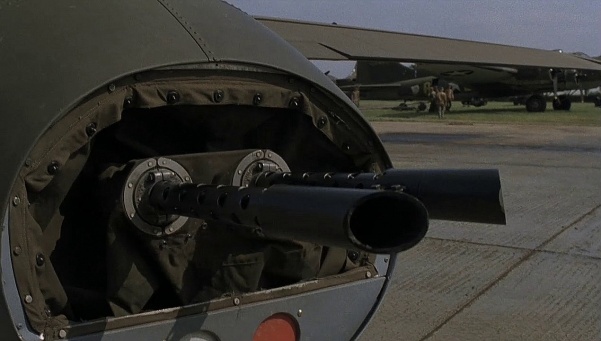

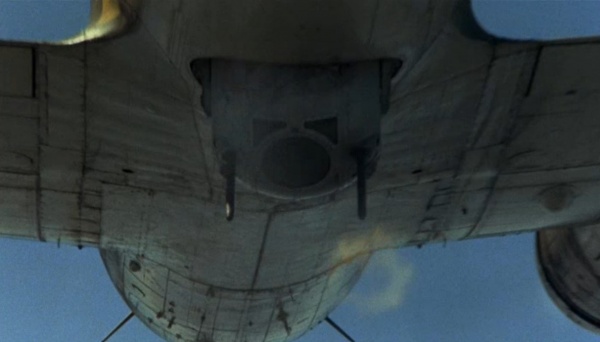
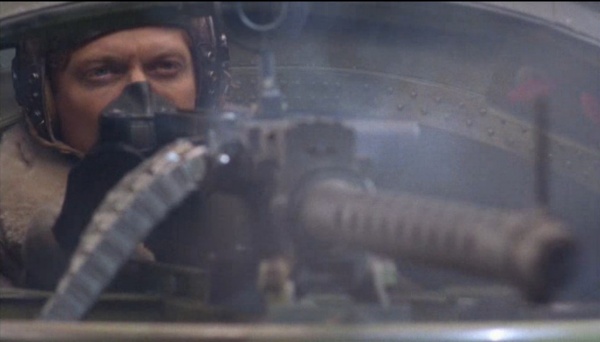
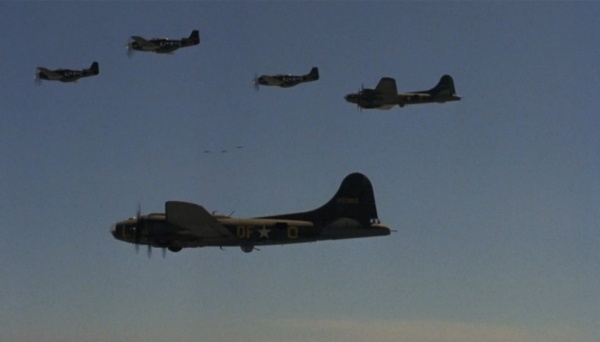
Hispano-Suiza HS.404 20mm cannon
No flying Messerschmitt Bf 109s existed when Memphis Belle was made, though several have been restored since. As a result, like almost all post-war movies starting with the German movie The Star of Africa in 1957, the Bf 109s in this film are "played" by Hispano Aviación Ha-1112-M1L "Buchon" fighters: the production had access to three such aircraft. The Ha-1112 is a Bf 109 derivative license-built in Spain during and following the war, and was easily available for film productions when the Spanish Air Force retired the Ha-1112 in 1965, having replaced it in service with second-generation jet aircraft like the F-104 and F-4 Phantom. Interestingly, in some shots of the 1967 film Battle of Britain, the Ha-1112 plays not just the Bf 109, but also its opponent, the Hurricane.
Ha-1112s were armed with Hispano-Suiza HS.404 20mm cannons in the wings, which can trace a common ancestry to the Oerlikon FF 20mm cannon with the German MG FF 20mm cannon that it was meant to portray. These "Bf 109s" attack the bombers on the way to Bremen.
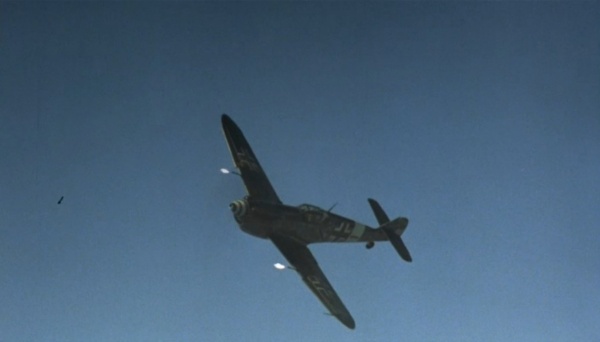
Other
M8 Flare Pistol
At the airbase, two M8 Flare Pistols are used to launch different colour flares, signifying a take off countdown, before the bombers are to take off.
